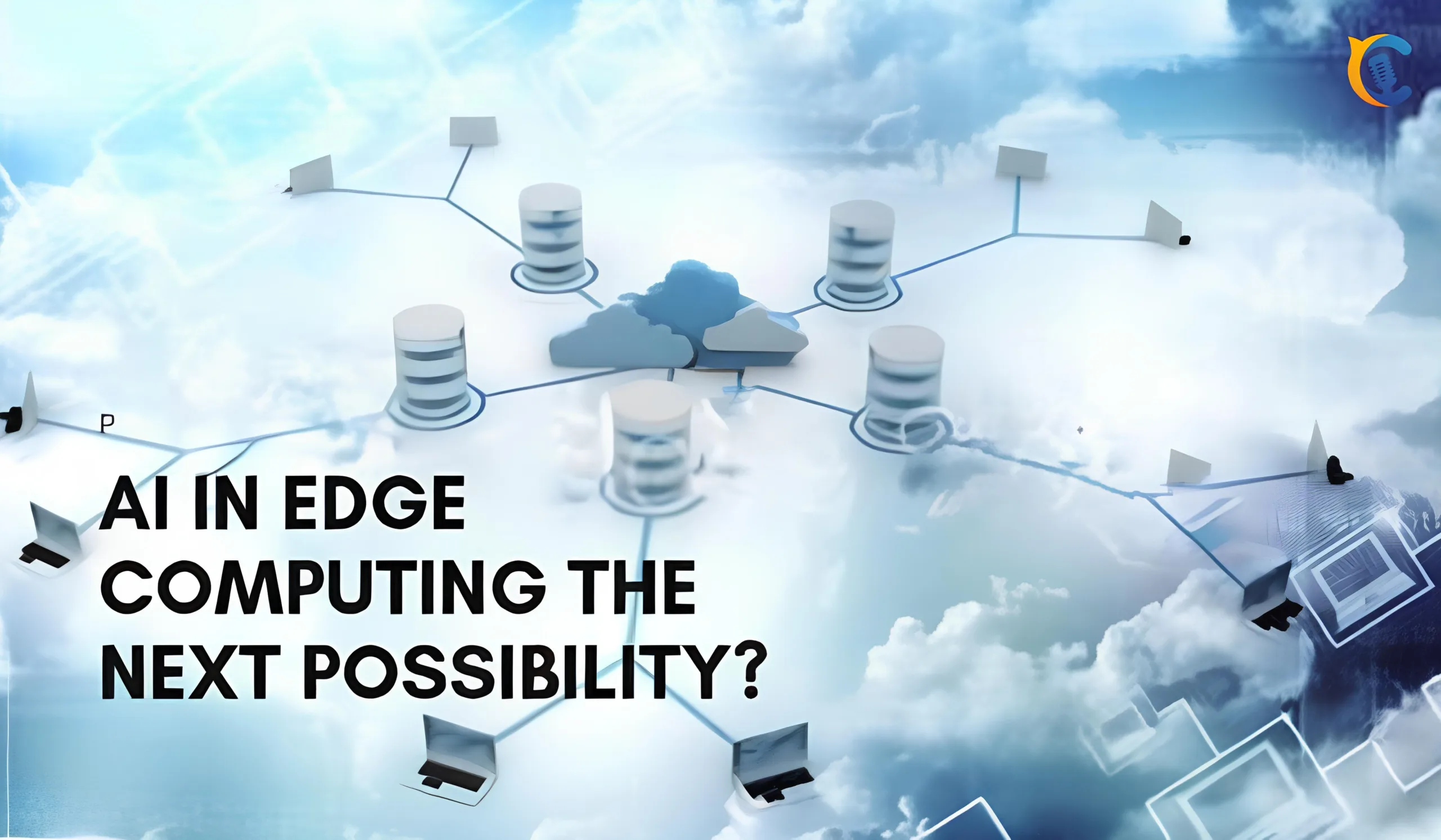Synergy of AI and Edge Computing: Revolutionizing the Future of 2023
Table of Contents
Introduction

Synergy of AI and Edge Computing: In the rapidly evolving landscape of technology, two innovative trends are converging to redefine the way we process and analyse data: Artificial Intelligence (AI) and Edge Computing. As we move towards a more interconnected world where data is generated at an unprecedented pace, the marriage of AI and Edge Computing holds immense potential. In this blog post, we’ll delve into the dynamic relationship between AI and Edge Computing, exploring their individual significance, their convergence, real-world applications, benefits, and the challenges that lie ahead.
Understanding AI and Edge Computing

AI, or Artificial intelligence, is the term used to describe the emulation of human intelligence functions by machines, primarily computer systems. These include perception, problem-solving, language understanding, reasoning, and learning. Systems can now accomplish tasks that would traditionally require human intellect, such as picture recognition and natural language processing, thanks to AI technologies like machine learning and deep learning.
Edge computing, on the other hand, involves processing and analysing data closer to its source, which is often referred to as the “edge” of the network. Unlike traditional cloud computing, where data is sent to centralised data centres for processing, edge computing brings computation and data storage closer to where they’re needed, reducing latency and improving real-time decision-making.
Convergence of AI and Edge Computing

The convergence of AI and Edge Computing is a symbiotic relationship that leverages the strengths of both technologies. AI algorithms, particularly those based on machine learning, can be deployed at the edge to enable local data analysis and real-time decision-making without the need for constant connectivity to remote servers. This synergy addresses the limitations of latency-sensitive applications and enhances efficiency in data processing.
Real-World Applications

The fusion of AI and Edge Computing has sparked innovative applications across various industries.
- IoT Devices: AI-enabled edge devices like smart thermostats and wearable health monitors can process data locally to provide quicker insights and responses.
- Autonomous Vehicles: AI-powered edge computing enables self-driving cars to make split-second decisions by processing sensor data directly within the vehicle.
- Manufacturing: Edge AI can optimise factory processes by analysing data from sensors in real time, enhancing efficiency and reducing downtime.
- Healthcare: Wearable devices equipped with AI at the edge can monitor patient vitals and alert healthcare professionals to critical changes.
Benefits of AI and Edge Computing Integration

- Reduced Latency: By processing data locally, edge computing reduces the time it takes to analyse and respond to information, which is critical for real-time applications.
- Bandwidth Optimisation: Edge computing reduces the need to transmit massive amounts of data to centralised servers by optimising bandwidth usage.
- Enhanced Privacy: Data remains localised, reducing the risk of sensitive information being transmitted over long distances.
- Scalability: AI at the edge allows for distributed processing, enabling scalability without overburdening centralised data centres.
Challenges and Considerations

- Resource Constraints: Edge devices may have limited computational power and storage, requiring efficient algorithms and model compression.
- Data Security: Localised data processing demands robust security measures to protect against unauthorised access.
- Model Updates: Keeping AI models up-to-date on edge devices presents challenges, necessitating strategies for remote updates and version control.
- Interoperability: Ensuring seamless integration between diverse edge devices and AI frameworks can be complex.
Navigating the Future of AI and Edge Computing

As we look ahead, it’s clear that the fusion of AI and Edge Computing is not just a passing trend but a transformative force that will shape the future of technology. Here are some key considerations and trends to keep in mind as we navigate this exciting journey:
1. Edge Intelligence Evolution: The evolution of edge devices will lead to increased computational capabilities, enabling more complex AI models to be deployed at the edge. This will pave the way for advanced applications such as real-time video analytics, natural language processing, and more.
2. Federated Learning: Federated learning, a decentralised approach to training AI models, aligns well with the principles of Edge Computing. It allows models to be trained collaboratively across multiple edge devices while keeping data localised, addressing privacy concerns.
3. 5G and Edge: The rollout of 5G networks will further accelerate the adoption of AI at the edge. The combination of low latency and high bandwidth will enable seamless real-time interactions, making applications like augmented reality, remote robotics, and autonomous vehicles more viable.
4. Security and Privacy: As AI and Edge Computing continue to intertwine, ensuring robust security measures and data privacy will be paramount. Secure boot processes, encryption, and authentication protocols will play a crucial role in safeguarding edge devices and the data they process.
5. Hybrid Cloud-Edge Solutions: The future will likely see the emergence of hybrid solutions that balance the benefits of both cloud and edge computing. Some tasks may still be better suited for centralised cloud processing, while others demand low latency and an immediate response from edge computing.
6. Industry-Specific Innovations: Different industries will harness the potential of AI and Edge Computing in unique ways. For example, in agriculture, sensors on farming equipment could analyse soil data in real time to optimise planting decisions.
7. Ethical and Regulatory Frameworks: As AI systems make critical decisions at the edge, ethical considerations and regulatory frameworks will become increasingly important. Ensuring transparency, accountability, and fairness in AI algorithms will be essential.
8. Collaboration and Partnerships: The successful integration of AI and Edge Computing requires collaboration among technology companies, researchers, policymakers, and industry leaders. Partnerships will drive innovation, standardisation, and the resolution of challenges.
AI and Edge Computing: Key Facts
- AI and edge computing combine to bring real-time data analysis to the edge of networks.
- Edge computing reduces latency by processing data locally, enhancing AI-driven applications.
- IoT devices benefit from AI at the edge, enabling quicker decision-making and response.
- Edge AI enhances privacy by processing sensitive data locally, minimising exposure.
- Autonomous vehicles rely on edge AI for split-second decision-making in dynamic environments.
- Healthcare leverages edge AI to enable remote diagnostics and personalised treatments.
- Energy efficiency improves as edge AI optimises resource usage in smart grids.
- Edge AI enables predictive maintenance, reducing downtime in industrial settings.
- Security systems employ edge AI to identify threats and intrusions in real time.
- Edge AI is revolutionising retail with smart shelves, checkout-free stores, and personalised experiences.
Conclusion
The convergence of AI and Edge Computing represents a technological paradigm shift with far-reaching implications. Together, they empower us to process and analyse data closer to its source, enabling real-time decision-making and unlocking new possibilities across industries. As the synergy between AI and Edge Computing continues to evolve, we must embrace opportunities while addressing challenges such as security, privacy, and ethical considerations. By nurturing a collaborative and forward-thinking approach, we can pave the way for a future where intelligent devices work harmoniously to enhance our lives, drive innovation, and propel us into a new era of technological advancement. The journey is just beginning, and the destination holds the promise of a smarter, more connected world.
- Arsenal team formation 2023: A Comprehensive Overview 2023
- Greece’s Epic Fight Against Devastating Wildfires
- NASA Shares First Images of US Pollution
- AIRCRAFT CRASHES IN AUSTRALIA’S NORTHERN TERRITORY DURING US MILITARY TRAINING EXERCISE
- Further Insights into the Top 20 US Cities with Highest Internet Usage


































